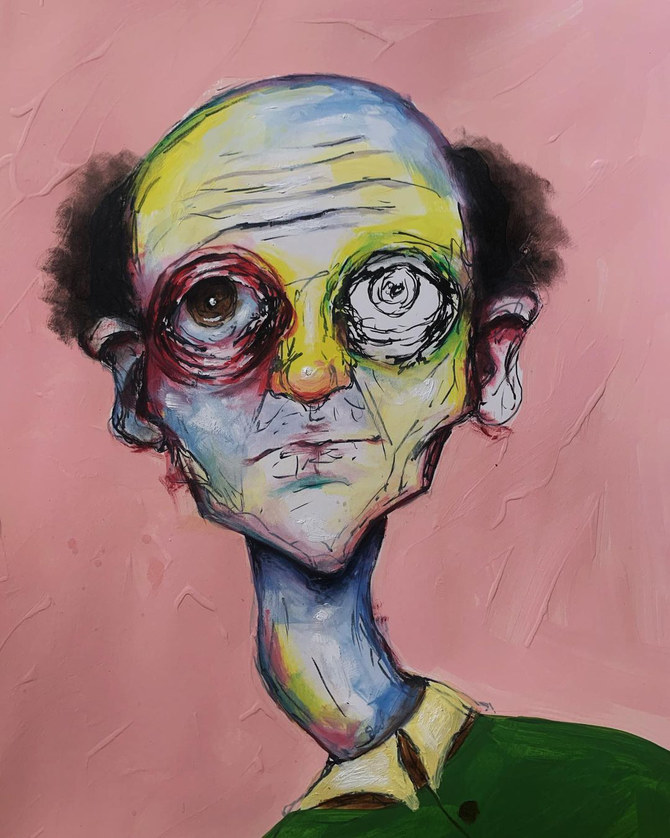RIYADH: In a world fixated on beauty and aesthetic perfection, Saudi artist Asrar Al-Qarni is boldly producing anti-aesthetic and unsettling art.
Through her work, the 33-year-old challenges traditional notions of beauty and protests conformity. She compels viewers to confront uncomfortable truths and explore darker aspects of society.
This unconventional approach to art can be seen as a romantic rebellion against society’s constraints, as well as a celebration of individuality and freedom of expression.
Al-Qarni told Arab News that anti-aesthetic art encourages people to look beyond the surface and find beauty in the unexpected and the unconventional. It seeks to disrupt the status quo and provoke thought and discussion about the nature of art itself: “Instead of being visually appealing and comforting, anti-aestheticism prioritizes evoking emotions and disturbing expression within the artwork,” the artist said.
This can lead to anti-aesthetic works being labeled ugly, jarring, or anti-art by those who prefer more aesthetically focused works.
By highlighting discord and dissonance in her paintings, Al-Qarni, a self-taught artist, creates a unique and thought-provoking experience for those who encounter her work. “Incorporating elements of chaos, ugliness and discomfort forces viewers to confront their preconceived notions about what art should be,” she added.
Al-Qarni became interested in anti-aesthetic art because of its raw human expression and beauty hidden by imperfections.
She uses bold colors and abstract shapes to create pieces that challenge viewers’ preconceptions and provoke a strong emotional response.
“I use various materials for my art, including mixed media, oil paint, acrylic paint and watercolor. My choice of materials depends on the specific technique or effect I want to achieve in my artwork,” Al-Qarni said.
By breaking free from the constraints of conventional beauty, the artist is pushing boundaries and inspiring others to think outside the box.
Al-Qarni said she cultivated her style through dedicated practice. She started copying and sketching cartoons from her favorite television shows as a child. “As I got older, I got into realistic portrait painting, trying to capture the world around me, but I soon realized that realism did not allow me to express my emotions deeply enough,” she added.
The Saudi artist eventually resorted to a more liberated method, allowing her to follow her instincts and let her brush strokes guide her: “When I hold the brush against the canvas, it becomes a way to quieten the noise of life and connect with my inner self, providing a source of relaxation and tranquility.”
The artist maintains a multi-purpose space where she paints, serving as both a studio and a cozy personal area.
“It is where I sleep, read and spend most of my time. Waking up surrounded by the creative mess of my art provides me with a sense of passion and inspiration to continue my artistic journey each day.”
Ten years ago, Al-Qarni decided to pursue art professionally, and she has not looked back since. Her work has been featured in galleries and exhibitions across Saudi Arabia, earning her recognition and acclaim from critics and audiences.
Al-Qarni’s first showing was in 2016 in Jeddah with Behance, the world’s largest network for showcasing and discovering creative work.
“Facing the audience, I received both compliments and critiques. The experience was helpful and encouraging, inspiring me to create more and improve my art,” she said.
She has taken part in several art exhibitions, such as the Misk Art Institute in 2019, which provides a platform for creative individuals to influence present-day discussions.
Al-Qarni also showcased her work at Grey Art Gallery in Alkhobar, and Zawaya Art Gallery and Sensation Art Gallery in Jeddah.
The artist gives each painting a title that reflects the overarching emotion or story behind the artwork. The title can be inspired by a novel, a song, or a personal experience related to the painting.
“How someone perceives and feels about a painting can vary depending on the person looking at it,” she added. “We all bring our own thoughts and experiences, which adds to the richness and meaning of any artist’s work.”
To aspiring artists who might be intimidated to share their artwork and innermost emotions with an audience, Al-Qarni preaches that the world needs art.
“Embrace the opportunity for growth and connect with other artists through feedback and experiences, and remember that every artist starts somewhere, and sharing your work is a step toward achieving your goals.”



















